PURPOSE This study aimed to verify the relationship between adolescent athletes’ julsil, competitive trait anxiety, and self-management. METHODS A total of 370 adolescent athletes who were registered with the Korean Sport & Olympic Committee participated in the survey; 24 insincere responses were excluded from the analysis, leaving a total of 346 participants. After verifying the construct validity of the measurement tool used in the survey, statistical and correlation analyses were performed. The research model was subsequently verified using structural equation modeling. RESULTS Adolescent athletes’ julsil had a significant positive effect on self-management but not on competitive trait anxiety. In addition, self-management was found to have a significant negative effect on competitive trait anxiety, and also completely mediated the relationship between julsil and competitive trait anxiety. CONCLUSIONS Adolescent athletes’ julsil does not increase competitive trait anxiety, but rather plays a role in reducing it by increasing self-management. These findings unveil mechanisms through which julsil can be used to enhance athlete performance.
PURPOSE This study examined Julsil impact on self-management and the moderating effect of achievement goal orientation in adolescent male athletes. METHODS Adolescent male athletes (n=248) registered with the Korean Sports & Olympic Committee participated in a survey. After exclusion of data from seven respondents who provided insincere responses, 241 responses were used for the final analysis. After verification of the measurement tool’s construct validity, technical statistical analysis and correlation analysis were performed. Finally, multiple regression analysis and PROCESS Macro (Model 1) were used to verify the research hypothesis. RESULTS 1) Male adolescent athletes’ Julsil and 2) task goal orientation had significant positive effects on self-management,, but ego goal orientation did not. 3) The moderating effect of task goal orientation on the relationship between Julsil and self-management was significant, but that of ego goal orientation was not. CONCLUSIONS 1) Male adolescent athletes’ Julsil and 2) task goal orientation had significant positive effects on self-management,, but ego goal orientation did not. 3) The moderating effect of task goal orientation on the relationship between Julsil and self-management was significant, but that of ego goal orientation was not.
PURPOSE The purpose of this study was to investigate the effects of perceived organizational support of high school football players on innovative performance. Of particular note, we focused on examining the mediation effect of self-management between perceived organizational support and innovative performance. METHODS A total of surveys returned was 137 and the data used for the final analysis was 130. The data was processed using SPSS 21.0 statistical program and Lisrel 9.2 for confirmatory factor analysis. RESULTS The results of the analysis were as follows: first, perceived organizational support of high school football players had a positive effect on players’ self-management. Second, players’ self-management had a positive effect on players’ innovative performance. Third, players’ self-management fully mediated between perceived organizational support and players’ innovative performance. CONCLUSIONS The study concluded that maximizing both perceived organizational support and self-management of the high school football players are necessary in order for the organization to achieve high level of innovative performance.

Purpose The purpose of this study was to verify their effectiveness as we develop and apply worksheets for improving life skills and resilience of collegiate Taekwondo athletes. Methods The study went through three stages: developing, applying, and evaluating. In the developing stage, literature review, expert meeting, and pilot test (n=25) were conducted to develop the worksheets. In the applying stage, 37 athletes participated in life skills program using the worksheets. Data were collected by survey and in-depth interview. In the evaluating stage, paired t-test, word cloud analysis, and inductive content analysis used to identify the effect of worksheets. Results First, the worksheets were composed of 3 stages (plan, acquisition, implementation) and 15 sessions including 12 factors of life skills. Second, the worksheets were applied in each phases such as planning, acquiring, and implementing. In the planning phase, they understood life skills knowledge and set goals. In the acquisition phase, students learned specific life skills’ strategies. In the practice phase, the acquired life skills were applied and practiced in real life and relationships. Third, the result of paired t-test showed that all the factors of life skills and 6 factors of resilience were significantly improved. In addition, word cloud and in-depth interviews revealed that the participants' cognitive and psychological changes were most prominent. Conclusions The life skills worksheets consists of 12 factors in 15 sessions and can be considered as an effective intervention tool for improving the resilience and life skills of collegiate Taekwondo athletes.

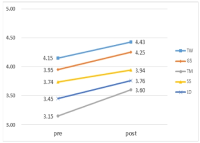
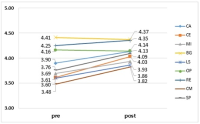



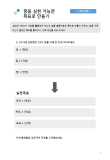
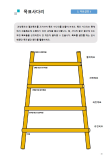
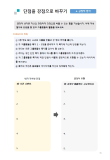
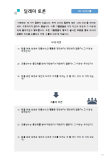



The purpose of this study was to examine psychological capital acquisition through Asian Games Participation. 17 of national women football players were completed Psychological Capitals Questionnair. The psychological capital consists of optimism, psychological skills, self-management, collective efficacy, and performance perception was investigated after the team call-ups and before the team-release. The data was analyzed by paired t-test. As results, Korean women football players’ collective efficient and performance perception showed a statistical significance at the beginning of the team call-ups but optimism, psychological skills, and self-direction did not show statistic significances. The team-harmony, interpersonal-management, team-power, sufficient training, trust in coach, efficient communication, and psychological football factors, which were subfactor of football players’ psychological capital, showed statistical significances. However, confidence, concentration, goal-setting, imagery, willpower, anxiety-control, mental-management, life-management, training-management, innate-behavior management, physical-management, football skills, mediative skills, and football intelligence factors did not have statistic significances. These results demonstrate that effects of mega sporting events-like experiences and psychological factors’ variability and inflexibility according to weather changes should be considered when it comes to discussion of psychological factors regarding players’ performance. It is expected that this study would be a fundamental resource for understanding of psychological influences through participations in mega sporting events and discussions about further psychological interventions for teams with environmental consideration as well as methodological developments which could measure effects of the psychological interventions.
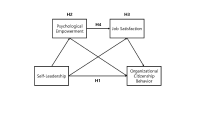
[Purpose] The purpose of this study is to draw practical implications applicable to the field through analysing serial multiple mediator model of self-leadership, psychology empowerment, job satisfaction and organizational citizenship behavior. [Methods] In order to achieve the purpose of this study, we surveyed Korea national league players(187 usable sample). Four hypotheses were tested using frequency analysis, exploratory factor analysis, reliability analysis, correlation analysis and PROCESS macro through SPSS statistics. [Results] The results are as follows. First, self-leadership has a significant effect on organizational citizenship behavior. Second, mediating effects of psychological empowerment between self-leadership and organizational citizenship behavior were significant. Third, mediating effects of job satisfaction between self-leadership and organizational citizenship behavior were significant. Fourth, serial multiple mediator effects leading to self-leadership→psychological empowerment→job satisfaction→organizational citizenship behavior were significant. [Conclusions] Korea national league players must perform self-leader, goal setting, self-observation, self criticism, constructive thinking strategies, dedication and voluntary attitude for clubs and colleagues. The team’s coaches should strive to praise the athletes for their pride, provide appropriate feedback, prevent job burnout, and the management of front office should make practical efforts such as improving the welfare environment and presenting the future vision of club.


This study was to verify the structure of efficacy related to performance perceived by short-track athletes when playing a match. Therefore, 50 players answered open questionnaires and 200 players participated in construct validity verification, a total of 250 players of short-track members of national, business and university team were sampled during the research phase. The data was analyzed through the study procedures. The results were as follows: First, efficacy structure of players during the match were categorized into three groups as game managing strategy(including course management, race control, match management and selective attention ability), psychological control ability(including positive imagery, match competition, competitive spirit, ability to handle hardship, anxiety control, and patience), and physical usage of ability(including physique, endurance, and quickness). Second, the result of the first construct validity verification through exploratory factor analysis showed 7 factors in 29 items as game management, course management, psychological control, physical use, coping with hardship, speed control and psychological stability. Finally, as a result of confirmatory factor analysis, short-track self-efficacy showed the 5 factor in 15 items except for coping with hardship and psychological stability.

Purpose The purpose of this studied to improve athletes’ performance through sports psychological skills training and counseling of a male canoe player in high school. Methods One male high school athlete in J area was interviewed for sports psychological skills training and counseling, and interviewed athletes and coaches diagnosed the potential psychological problems of athletes. Through this process, the athlete gained the ability to control anxiety about the game and strengthened the attention-focused ability to increase his confidence and set a goal for improving concentration. For effective training, sports psychological counselors, athletes, and coaches met once a week to create a routine. and participated in direct training on a boat with the coach every week. Sports psychological skills, anxiety about competition, and self-management of athletes were measured before and after to confirm the effectiveness of training of athletes' psychological skills. Results As a result, athletes' psychological skills and anxiety decreased, their confidence increased, and their concentration, which was diagnosed as an urgent problem of athletes, improved. Conclusions psychological skills of athletes, psychological shortcomings of players were reinforced, thus enhancing the athletes' performance. This suggests the effectiveness and necessity of training in sports psychological skills. It is hoped that continued support will serve as an opportunity to diagnose potential psychological problems of student athletes and apply them to training to contribute to improving their performance.
Purpose This study seeks to explore the process where drop-out elite athletes collect their life skills obtained during their sports career and transfer them to their daily lives. Methods An open-ended questionnaire survey was conducted on a total of ninety retired elite athletes and the responses were analyzed. Based on the results of inductive analysis, five subjects were selected for a follow-up in-depth interview. The responses to the open-ended questionnaire were analyzed by the inductive content analysis method and the results from in-depth interviews by the deductive content analysis method. Results A total of 478 life skills were collected from the drop-out elite athletes and structuralized into four general categories: psychological skill, social skill, self-management skill, and goal-setting skill. The results of this study have revealed that life skills positively transferred to their future courses of lives and daily lives. Conclusion It is believed that the results of this study will be helpful to understanding the concept of sports life skills, studying the possibility of transfer, and provide the basic data for helping drop-out elite athletes with re-socialization and positive adaptation.
The purpose of this study was to examine the effects of happiness improvement program on psychological variables which were happiness feeling, self-esteem, interpersonal relationship, internal-external locus of control, stress, coping, perceived performance and physiological variables such as cortisol and serotonin of collegiate badminton players. The participants consisted of 10 collegiate badminton players. Happiness improvement program for collegiate badminton players was developed by previous literatures, in-depth-interview, psychological test data, and consultation of happiness improvement experts. The happiness improvement program consisted of 12 intervention program: orientation, rapport development and the understanding happiness, self-esteem enhancement techniques, interpersonal relationship strategies, stress and coping management, peak performance methods, and action plan of happiness improvement program. Each program was applied to participants in about 90-120 minute a session(2-3 times session a week). The instruments of this study were made up of three broad categories: (a) psychological data, b) physiological data, and (c) qualitative data. Firstly, happiness improvement program significantly increased happiness feeling, self-esteem, internal-external locus of control, interpersonal relationship capability, coping skills of collegiate badminton players. Secondly, happiness improvement program significantly decreased stress of collegiate badminton players. Thirdly, participants positively perceived the effects of happiness improvement program on psycho-physiological variables. The limitations of this study and future implications were discussed.